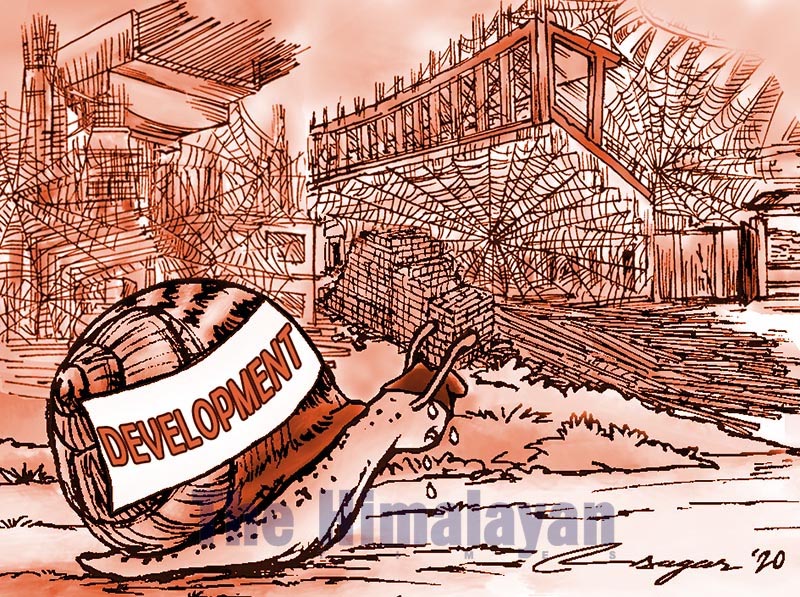Construction management: Needs enhancing performance
The excavator has been used excessively in the construction of roads without any planning, causing landslides, slope fall and environmental degradation. Quality control is also lacking in the construction of roads, buildings and power projects
Broadly, the scope of construction management can be viewed from international and national perspectives. China is the largest infrastructure market, accounting for 40 per cent of the global infrastructure demand. There are about 225 top international companies that compete with each other for global construction tenders. The global market (demand) over the next 20 years for infrastructure is forecast at $65 trillion. And the world is looking for good construction managers. The construction sector reflects a nation’s development. Nepal’s construction sector is said to contribute about 10-11 per cent to its GDP and uses about 35 per cent of the budget. It provides employment to millions of people. Nepal is in the process of rapid infrastructure development. There are 22 National Pride projects at present. As per 2013 data, there are 325 class A, 374 class B, 1,347 class C and around 15,000 class D contractors. Nepalese contractors have been upgrading themselves with the latest construction technology and saving huge amounts of money from going to foreign contractors.
Haphazard construction work has, however, created several problems in Nepal. The excavator has been used excessively in the construction of roads without any planned development, causing landslides, slope fall and environmental degradation. There is also lack of quality control in the construction of roads, buildings, canals and hydropower projects.
Investment in large infrastructure projects is critical to enable a country to achieve long-term growth and sustainable development. Delay is a major problem in the construction industry. The Melamchi Drinking Water Supply Project, for instance, was started in December 2000 with the aim of completing it in 2007, but it is still incomplete. The World Bank (WB) withdrew its investment from the project in 2005 due to delays. In a report published by the Commission for the Investigation of Abuse of Authority, in 2075 BS, 1,032 projects have neither been terminated nor their time extended.
There is a shortage of skilled labour in the construction sector of Nepal. Those who have attained training tend to fly abroad for better salaries and opportunities. The Federation of Contractors Association Nepal (FCAN) has listed some of the problems in construction as: Pre-qualification procedure, absence of balanced and standard bidding document, government rules and regulations, approval of the lowest bidder, taxation system, delay in payment, inflation, brain drain and unavailability of construction materials.
The Technical Audit carried by the National Vigilance Centre in 2074/2075 recorded 285 non-compliances related to construction projects. They are defective construction, improper storage of construction materials, lack of quality assurance plan, negligence of consultant and site engineer, poor workmanship during construction work, and lack of planning and preparation for daily work from the contractor. Other shortcomings include no practice of getting approval of the construction drawing, mistake in the engineer’s estimation, workers not using safety tools, the contractor trying to compromise on manpower and equipment, and lack of monitoring by project manager.
Construction management studies deal with the health and safety of workers, ethical issues in the construction sector, material waste standard, familiarisation with construction equipment, tools and techniques of construction planning and scheduling, application of value engineering in the procurement of materials, contractual procedures, arrangement of facilities and job layout, project quality control, quality assurance and total quality management. It also deals with financial management, risk management, annual procurement plan, environmental management plan, implementation of building by-laws, and codes and other regulations.
As a construction manager, one needs to be educated and pick up the skills of planning, controlling and co-coordinating construction projects. It is also necessary to make optimal use of the people and the resource. These skills are not developed overnight. Training, workshops, seminars and practices are necessary. The construction of roads, airports, housing and other projects need well qualified construction managers.
There is a need for improving performance through knowledge in the construction industry, where men, materials, machinery, money and management work together to build a facility. Only a construction manager can enhance quality control to reduce the potential for defects and poor workmanship, maximise resource efficiency through procurement of labour, materials and equipment, and play an important role in implementing various operations through efficient and effective control of planning, design, estimation, contracting and construction in the entire process.
It is good that master’s level courses in construction management are taught in various universities of Nepal. The thesis and paper works on construction management issues can help the concerned stakeholders of government and non-government bodies to solve the various issues in construction management.
Neupane is Assistant Professor, Central Campus of Engineering, Mid-Western University






